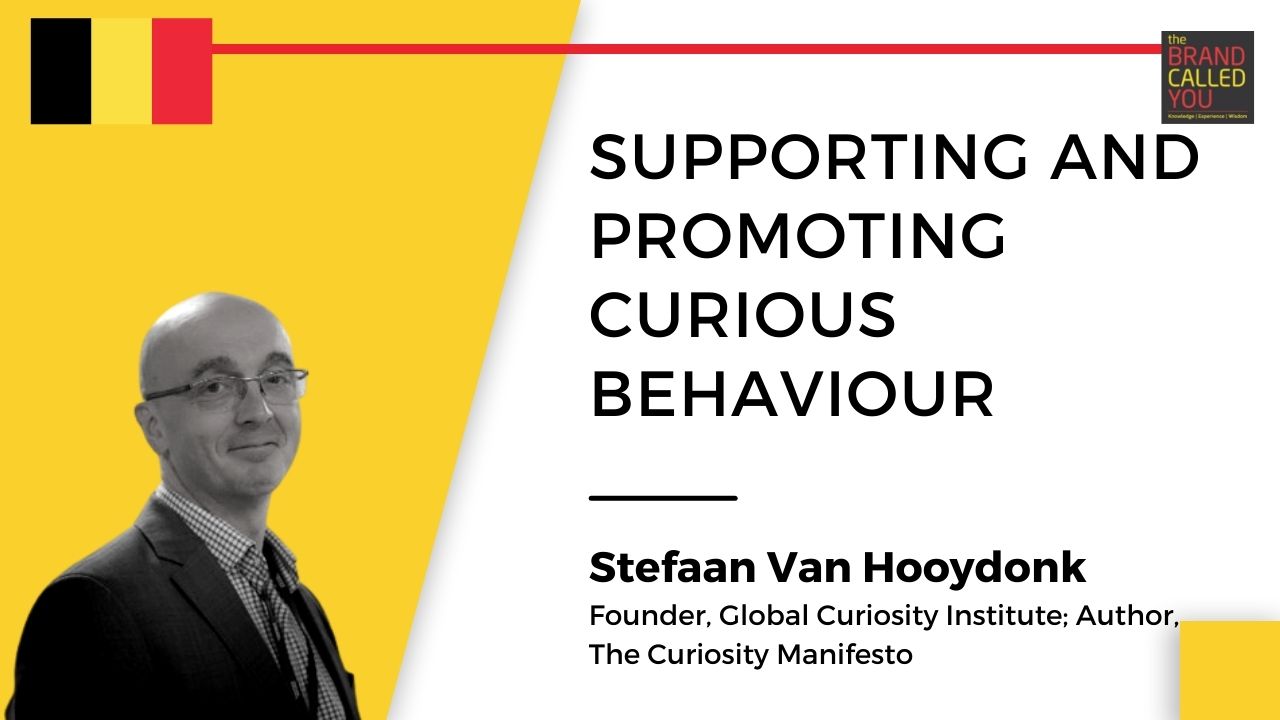Stefaan Van Hooydonk, Founder, Global Curiosity Institute; Author, The Curiosity Manifesto
Stefaan is the founder of the Global Curiosity Institute. He consults global corporations, leadership teams and individuals to help build stronger curiosity muscles. He helps them in baselining individual and workplace curiosity, and supports them with designing and implementing intentional curiosity improvement projects and learning initiatives.
Podcast
Overview
Steve Stoute has said, “Without curiosity, there will never be any innovation.” We have evolved from the early men’s days to a technologically developed, globally-connected world with the power of innovation.
It stems from the curious mindset of knowing more and the constant hunger to learn.
With the fast-paced working environment and competition, curious minds are capable of bringing out easy and efficient methods of completing a task.
Constant learning also enables one to understand a job role and bring forth new ideas.
Today, we have Stefaan Van Hooydank, promoter of the concept of curiosity for 360 development of our professional and personal life. Listen to this enriching and thought-provoking conversation, and get inspired to apply it to life.
About Stefaan Van Hooydonk
Stefaan Van Hooydong is the founder of Global Curiosity Institute, a venture supporting and promoting curiosity among people and business leaders. He is also the co-founder and dean of Earth Academy.
Stefaan has authored a book titled “The Curiosity Manifesto” Tune in to the conversation to understand the concept of curiosity for the well-being of our personal and professional life.
DISCUSSION
Stefaan talks about the venture that he established as he realized life values while working with several organizations. He narrates how he observes a certain group of people who were always reading and trying to learn new things, but not all organizations support the curious nature.
He says, “There are people who are naturally hungry and humble. I started it the venture because not all organizations are supporting such behavior patterns.”
Stefaan emphasizes the importance of curiosity to be adaptable to changing times like COVID and climate change.
His organization currently focuses on businesses. He plans to gradually foray into general society, as well, to develop the curious muscle amongst children and teachers.
Stefaan also speaks about research stating that curious people make more money and become leaders quicker than their peers. He also feels that the business organizations that embrace curiosity in their culture and value system are more successful.
Understanding Curiosity: Negative vs Positive
Stefaan talks about the perception of curiosity amongst different sections of society. He feels that people in power hamper the curious nature of their employees or the public in general. He says, “Curious people are thought to be difficult to manage.
It is the curious leaders who are capable of tapping into the knowledge. It is not possible anymore to think of people as just cogs in the system. We need to allow them to have their ideas, and challenge the status quo.”
He gives a very interesting narration of the journey of curiosity.
- Early philosophers like Aristotle thought of curiosity as positive.
- In middle age, it was seen in a negative light, as the opposite of curiosity is devotion.
- Curiosity developed to understand science
Stefaan agrees that closed cannons in religions inhibit curiosity, while open cannons promote it.
Book: The Curiosity Manifesto
Stefaan then talks about the two hypotheses of his book.
- Curiosity is both nature and nurture. He feels 50 % is innate and 50 % can be developed by interacting with the environment.
- In times of crisis, we need curiosity much more than times of stability. He differentiates between the stable 20th century with the several problems of the 21st century.
His book, which will be available online from May 2022, covers a great deal about the importance of curious leaders. His book covers three kinds:
- Business
- Empathic: understanding behavior
- Personal: to dig deeper into one’s soul and value system
Stefaan says, “For leaders, curiosity doesn’t have to be extroverted. The need is of the level of intentionality and awareness.”
He explains the influence of a leader’s curious nature on the team.
Cultural Impact
Stefaan ends the conversation by talking about different country cultures and business cultures. He says, “Cultures that high from political or religious perspectives require people to be conformists than curious.”
Profile
Stefaan is the founder of the Global Curiosity Institute. He consults global corporations, leadership teams, and individuals to help build stronger curiosity muscles.
He helps them in baselining individual and workplace curiosity and supports them with designing and implementing intentional curiosity improvement projects and learning initiatives.
Stefaan started his career in investment consulting in China. From there he moved to set up the executive education arm of a major business school in Shanghai, China Europe International Business School (CEIBS), which he ran for 5 years.
Subsequently, he moved to the corporate side and set up global learning teams and innovative corporate universities for Nokia (China/Finland), Agfa Healthcare (Belgium), Philips (the Netherlands), Flipkart (India), Saudi Aramco (Saudi Arabia), and Cognizant (UK).
His last role was that of Chief Learning Officer for Cognizant, where he overlooked the learning and development for over 300k associates across the globe. He has been globally recognized for his innovative approach to learning, people, and technology.


